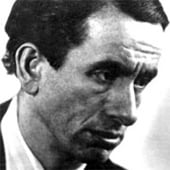
Hans Krása
Hans Krása ist der Komponist von Brundibár, einer der beliebtesten Kinderopern weltweit und eines der berühmtesten Musikstücke, die mit dem Konzentrationslager Theresienstadt verbunden sind * entstammte einem gemischt deutsch-tschechischen Elternhaus * studierte an der Deutschen Musikhochschule in Prag * Zemlinsky als Mentor ermutigte sein Interesse an Mahler und dem frühen Schönberg * in den 1920ern von der französischen Musik beeinflußt, insbesondere von Debussy, Ravel, Les Six und Strawinsky * reiste zu Studien bei Roussel nach Paris, blieb jedoch nur wenige Monate dort sowie an der Berliner Musikhochschule * Krása pflegte einen bohèmehafter Lebensstil, schuf verhältnismäßig wenig Kompositionen * zu seinen Erfolgen zählten eine von Koussevitzky in Boston gespielte Symphonie sowie die preisgekürte Oper Verlobung im Traum, die im Deutschen Theater in Prag von George Szell dirigiert wurde * Bühnenwerke in Zusammenarbeit mit dem tschechischen Autor Adolf Hoffmeister, darunter Brundibár (1938), eine Kinderoper in eingängigem, an Volksmusik angelehntem Idiom * war nach den Münchner Verträgen nicht in der Lage, vor der Deutschen Okkupation 1939 aus Prag zu flüchten * wurde 1942 als Jude nach Theresienstadt deportiert * in überarbeiteter Fassung erlebte Brundibár dort 55 Aufführungen, dokumentiert auch durch einen Nazi-Propagandafilm, der anläßlich der Lagerinspektion durch ein Komitee des Internationalen Roten Kreuzes gedreht wurde * zu den Kompositionen der letzten Lebensjahre gehören eine Ouvertüre für kleines Orchester und Drei Lieder für Bariton, Klarinette, Viola und Violoncello * Hans Krása wurde 1944 in Auschwitz ermordet
Zu Hans Krásas bekanntesten Werken zählen:
Thema und Variationen für Streichquartett (1936)
Brundibár (1938/43) Kinderoper
Passacaglia und Fuge für Streichtrio (1943)
Ouvertüre für kleines Orchester (1943-44)
"Brundibár birgt eine zeitlose Erinnerung nicht nur an die tragische Unterdrückung, unter der viele zu leiden hatten, sondern auch an die Tatsache, daß Schönheit selbst aus den schlimmsten Umständen heraus erstehen kann." — Opera for Youth
